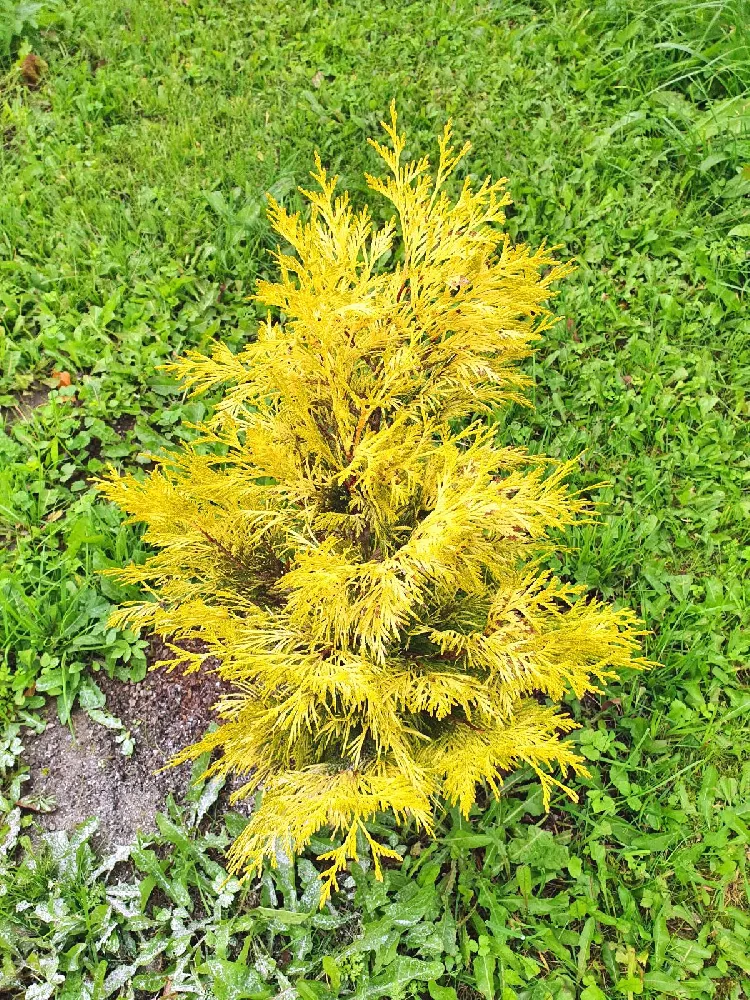- Home >
- Ornamental Trees >
- Forever Goldy Arborvitae Tree
Forever Goldy Arborvitae Tree for Sale - Buying & Growing Guide
The forever goldy arborvitae tree, Thuja plicata '4EVER,' adds a splash of color to any garden setting. Its leaves are a lovely golden-flecked yellow, although they turn a warm copper color in fall. At any time of year, they add interest and stature to gardens both small and large, as the color continues throughout the colder months of winter. They have a crisp, vertical silhouette that, when left unpruned, is pyramidal in shape. The feathery foliage requires little pruning or maintenance, and the trees will slowly grow to a height of 10 to 12 feet. Best of all, they are easy to care for and resistant to disease and insect pests. They are hardy trees, too, capable of thriving down to -10 degrees Fahrenheit. Here are a few more reasons to order yours today:
- Maintains a narrow, 3- to 4-foot width, making it an excellent plant to add a vertical note to your garden.
- It is perfect for informal or formal hedges.
- It makes an excellent foundation planting.
Enter your zip code to find nearby stores that may carry this plant.
Plant Care
Sunlight

The forever goldy arborvitae thrives in partial to full sun, with at least four hours of direct light a day.
Watering
Water regularly when young; mature specimens can handle drier conditions but benefit from an inch of water a week.
Fertilizing

Fertilize in spring with a product formulated for evergreen trees and shrubs, following label directions.
Planting and Care
Planting instructions
Choose a site for your arborvitae that is sheltered from prevailing winds, if possible, in soil that drains well. In the southern end of its range, it will appreciate light shade in the afternoon. Unpot your sapling, teasing out any encircling roots, which can girdle the tree and slowly kill it. Dig a hole that’s as deep as the root ball and twice as wide. Place the plant in the hole and, while holding it upright and steady, fill in around it with topsoil, tamping down as you go to eliminate air pockets. Water thoroughly. Apply a 2- to 3-inch layer of organic mulch, such as bark chips, around the root zone, but don’t let it touch the trunk, which can encourage rot.
Watering and nutrients
When newly planted, water your forever goldy arborvitae a few times a week. Once you see new growth appearing, cut back to once a week, giving it an inch of water each time. A mature plant can handle minor droughts but will be happier if it receives supplemental water during very hot or dry weather. Fertilize your arborvitae in early spring, using a balanced, slow-release product that is designed for evergreens.
Pollination
As a conifer, the forever goldy arborvitae does not have flowers to aid in reproduction. The work of creating seeds is carried out by small male and female cones that produce pollen and seeds.
Pruning
This arborvitae needs little pruning — just monitor the tree for broken, diseased, or damaged limbs, and trim these out whenever you see them. If you wish to create a more formal shape than the tree’s natural pyramidal form, you can prune new growth lightly to create a more clipped hedge shape.
Pests and diseases
The forever goldy arborvitae is a resilient tree that isn’t prone to disease or insect pressure. Taking good care of your tree will help it to fend off any infestations. If you see any sign of bark beetles, prune out infected branches immediately. These small beetles are about the size of a grain of rice and feed on branches. Canker diseases, which are fungal in nature, are sometimes seen on Thuja cultivars. Once again, the best defense is to prune out diseased wood, which usually spreads from the lower branches to the upper, and is characterized by dropped needles and branch dieback.
Achieving maximum results
An additional benefit to these small trees is that they grow beautifully in containers, where they will achieve maximum growth of roughly 4 to 8 feet, depending on the size of the pot. Imagine a matched pair of two forever goldy trees in terra cotta pots flanking a front doorway or gracing a back patio. If you choose to grow your arborvitae in a container, be sure to choose one that has good drainage in the bottom, and which is about twice the size of the root ball. Container-grown plants need more supplemental watering than those grown in the grown, as well as regular feeding. Be especially diligent if your pot-grown trees are under an overhang, where they won’t have access to rain.
FAQs
Where does the forever goldy arborvitae grow best?
How can I best incorporate this tree into my landscape?
The forever goldy arborvitae works well as a specimen tree and in mixed borders. Consider placing it in front of taller plantings with darker green leaves, which will contrast with the forever goldy's golden-yellow foliage. It can be grown as a hedge, providing privacy and a windbreak, and it would look elegant lining a walkway leading to a front door or patio.
How long does a forever goldy arborvitae live?
Under ideal conditions and when well cared for, a forever goldy arborvitae may live as long as 70 to 80 years. Since it is resistant to disease pressure and insect pests, there are few factors that will kill the tree prematurely. Planting it in a sunny spot and giving it the right amount of water and food should ensure a long life for your tree.
You can't add more Product Name - Product size to the cart.
OK

